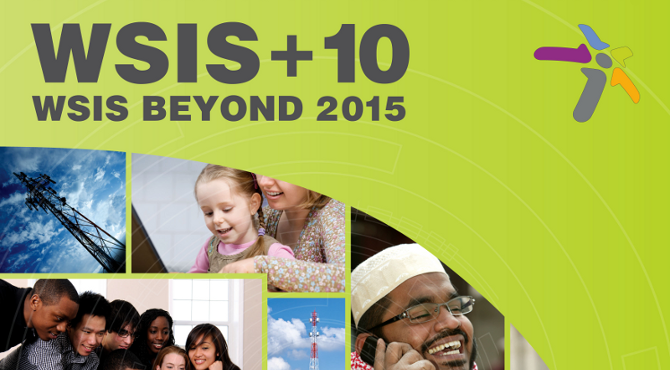
ICT4Peace at UN World Summit on the Information Society (WSIS) 10 Year Review Consultations in New York
Former Canadian Ambassador Paul Meyer, Senior Advisor, ICT4Peace Foundation, kindly represented ICT4Peace at the Second World Summit on the Information WSIS+10 Interactive Stakeholder Consultations at UN Headquarters in New York on October 19, 2015.
In December of 2003, the world came together in Geneva at the World Summit on Information Society (WSIS) to declare a “common desire and commitment to build a people-centred, inclusive and development-oriented Information Society,” and ushered in an era of harnessing the power of information and communication technology to contribute to the achievement of the Millennium Development Goals (MDGs). The resulting Geneva Plan of Action established targets and the eleven action lines, which guide development in specific areas.
The second phase of WSIS, conducted in Tunis in 2005, built upon the achievements of the Geneva Plan, with the resulting Tunis Agenda addressing additional issues, such as financing and internet governance. Paragraph 111 of the Tunis Agenda, endorsed by the General Assembly in resolution 60/252, requested the General Assembly to undertake the overall review of the implementation of the outcomes of WSIS in 2015. In response, the General Assembly in resolution 68/302, decided that the overall review will be concluded by a two-day high-level meeting on 15 and 16 December 2015 of the General Assembly, to be preceded by an intergovernmental process that also takes into account inputs from all relevant stakeholders of WSIS.
ICT4Peace has been actively participating in the preparatory process for the WSIS plus 10 Meeting in New York in December 2015, as reflected in these events and reports by the ITU and the UN CSTD.
Statement by Paul Meyer, Senior Advisor, ICT4Peace to Second WSIS+10 Interactive Stakeholder Consultations – UN HQ, October 19, 2015, New York (download as PDF here).
“On behalf of ICT4Peace, an NGO committed to promoting a peaceful cyberspace, I welcome this opportunity to contribute to the WSIS+10 preparatory process. WSIS represented the first dawning of international consciousness of the great potential of information and communication technologies for advancing the goals of the international community. The ensuing decade has only served to highlight the importance of ICTs and in particular the Internet for promoting the well-being of humanity. With over three billion Internet users, two-thirds of whom reside in the global south it is imperative that this versatile tool is fully utilized to promote the core objectives of the United Nations: security, human rights and development.
From our perspective, a crucial theme to emerge from WSIS and which is not given the profile it merits in the zero draft document before us, is the need for a peaceful cyberspace. Maintaining cyberspace as a realm for peaceful use for the benefit of all humanity is a fundamental precondition for a healthy information society today and in the future. As the preamble to the Sustainable Development Goals document, adopted here last month, rightly reminded us: “there can be no sustainable development without peace”.
This interrelationship was already evident to the drafters of the 2005 Tunis Commitment, paragraph 36 of which reads “We value the potential of ICTs to promote peace and to prevent conflict which, inter alia, negatively affects achieving development goals. ICTs can be used for identifying conflict situations through early-warning systems preventing conflict, promoting their peaceful resolution, supporting humanitarian action, including protection of civilians in armed conflict, facilitating peacekeeping missions, and assisting post conflict peace-building and reconstruction”
We believe the intervening years have amply proven the wisdom of this stance. The last decade has also served to highlight the magnitude of the threat from malicious cyber activity that can wreck havoc on users, be they states, companies, NGOs or just plain individuals. We consider this risk and the imperative to preserve cyberspace for peaceful purposes, requires explicit recognition in the outcome document.
It might best come early under the “Building Confidence and Security in the use of ICTs” section and consist of a reaffirmation of paragraph 36 of the Tunis Commitment regarding the potential of ICTs to promote peace and to prevent conflict. If specific citing of paragraph 36 is not possible a suitable sentence would be “Maintaining a peaceful cyberspace and using ICTs as tools for conflict prevention is fundamental to our vision of the information society”.
Such an affirmation is incumbent on those who wish to prevent conflict from compromising this special environment for humanity and to promote instead the immense contribution ICTs can make in achieving the peacemaking, peacekeeping and peace-building goals of the UN and the international community as a whole.”
